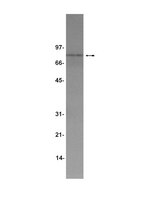Megakaryocyte polyploidy is inhibited by lysyl oxidase propeptide.
Eliades, A; Papadantonakis, N; Matsuura, S; Mi, R; Bais, MV; Trackman, P; Ravid, K
Cell cycle (Georgetown, Tex.)
12
1242-50
2013
Show Abstract
Megakaryocytes (MKs), the platelet precursors, undergo an endomitotic cell cycle that leads to polyploidy. Lysyl oxidase propeptide (LOX-PP) is generated from lysyl oxidase (LOX) pro-enzyme after proteolytical cleavage. We recently reported that LOX, a known matrix cross-linking enzyme, contributes to MK lineage expansion. In addition, LOX expression levels are ploidy-dependent, with polyploidy MKs having minimal levels. This led us to test the effects of LOX-PP on the number and ploidy of primary MKs. LOX-PP significantly decreases mouse bone marrow MK ploidy coupled with a reduction in MK size. MK number is unchanged upon LOX-PP treatment. Analysis of LOX-PP- or vehicle-treated MKs by western blotting revealed a reduction in ERK1/2 phosphorylation and in the levels of its downstream targets, cyclin D3 and cyclin E, which are known to play a central role in MK endomitosis. Pull-down assays and immunochemistry staining indicated that LOX-PP interacts with α-tubulin and the mictotubules, which can contribute to decreased MK ploidy. Thus, our findings defined a role for LOX-PP in reducing MK ploidy. This suggests that high-level expression of LOX in aberrantly proliferating MKs could play a part in inhibiting their polyploidization via LOX-PP. | Western Blotting | 23518500
 |
Low or undetectable TPO receptor expression in malignant tissue and cell lines derived from breast, lung, and ovarian tumors.
Erickson-Miller, CL; Pillarisetti, K; Kirchner, J; Figueroa, DJ; Ottesen, L; Martin, AM; Liu, Y; Kamel, YM; Messam, C
BMC cancer
12
405
2012
Show Abstract
Numerous efficacious chemotherapy regimens may cause thrombocytopenia. Thrombopoietin receptor (TPO-R) agonists, such as eltrombopag, represent a novel approach for the treatment of chemotherapy-induced thrombocytopenia. The TPO-R MPL is expressed on megakaryocytes and megakaryocyte precursors, although little is known about its expression on other tissues.Breast, lung, and ovarian tumor samples were analyzed for MPL expression by microarray and/or quantitative reverse transcription-polymerase chain reaction (qRT-PCR), and for TPO-R protein expression by immunohistochemistry (IHC). Cell line proliferation assays were used to analyze the in vitro effect of eltrombopag on breast, lung, and ovarian tumor cell proliferation. The lung carcinoma cell lines were also analyzed for TPO-R protein expression by Western blot.MPL mRNA was not detectable in 118 breast tumors and was detectable at only very low levels in 48% of 29 lung tumors studied by microarray analysis. By qRT-PCR, low but detectable levels of MPL mRNA were detectable in some normal (14-43%) and malignant (3-17%) breast, lung, and ovarian tissues. A comparison of MPL to EPOR, ERBB2, and IGF1R mRNA demonstrates that MPL mRNA levels were far lower than those of EPOR and ERBB2 mRNA in the same tissues. IHC analysis showed negligible TPO-R protein expression in tumor tissues, confirming mRNA analysis. Culture of breast, lung, and ovarian carcinoma cell lines showed no increase, and in fact, showed a decrease in proliferation following incubation with eltrombopag. Western blot analyses revealed no detectable TPO-R protein expression in the lung carcinoma cell lines.Multiple analyses of breast, lung, and ovarian tumor samples and/or cell lines show no evidence of MPL mRNA or TPO-R protein expression. Eltrombopag does not stimulate growth of breast, lung, or ovarian tumor cell lines at doses likely to exert their actions on megakaryocytes and megakaryocyte precursors. | Western Blotting | 22967017
 |
miR-28 is a thrombopoietin receptor targeting microRNA detected in a fraction of myeloproliferative neoplasm patient platelets.
Girardot, M; Pecquet, C; Boukour, S; Knoops, L; Ferrant, A; Vainchenker, W; Giraudier, S; Constantinescu, SN
Blood
116
437-45
2010
Show Abstract
BCR-ABL negative myeloproliferative neoplasms (MPNs; polycythemia vera, essential thrombocythemia, primary myelofibrosis) are malignant diseases arising from a multipotent hematopoietic progenitor, frequently altered by JAK2 V617F or other JAK/STAT activating mutations. The thrombopoietin receptor (TpoR, MPL) is one of the major dimeric cytokine receptors that use JAK2 in the myeloid lineage, and was found to be down-modulated in certain MPN patients. We searched for negative regulators of MPL expression. Here we report that miR-28 targets the 3' untranslated (3'UTR) region of MPL, inhibiting its translation, as well as other proteins potentially involved in megakaryocyte differentiation, such as E2F6. Expression of miR-28 in CD34-derived megakaryocytes inhibited terminal differentiation. miR-28 was found to be overexpressed in platelets of a fraction of MPN patients, while it was expressed at constant low levels in platelets from healthy subjects. Constitutive activation of STAT5 leading to autonomous growth of hematopoietic cell lines was associated with increased miR-28 expression. We discuss how down-modulating MPL and other targets of miR-28, and of related miR-708 and miR-151, could contribute to MPN pathogenicity. | Western Blotting | 20445018
 |












